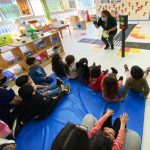Increasingly more often, we see how the current social demands are permeating into Chilean classrooms. With gender, for example, the student demands seem to be ahead of the changes in the rest of the school community. So, what are we facing?
By Francisca Leighton / franleighton@udec.cl
“Gender and Curriculum: An Approach from the Perspective of Social Justice of Teachers within the Chilean School System” is the name of the study made by the Professors from the Faculty of
Education of Universidad de Concepción, Rosse Marie Vallejos, Angélica Corrales, Marcela Palma, and the researcher of Universidad Nacional de La Plata, Argentina, Juan Gabriel Luque, who are
part of the research group “Teacher Training: Curriculum and Gender Policies”.
From what the researchers said, studies on both domestic and international gender and education topics demonstrate a tension between needs emerging from the social and cultural
context to include these issues and the responses of the school system to them.
An example of this emerges in the development of codes using what has been called “a hidden gender curriculum”, that is to say, a way where one gender is favored over the other in mixed education, for example, when men are encouraged to stand out in science or math degrees, while women are not.
This would affect the conception of the curricular field, and its incorporation in the pedagogical practice of teachers considering a social justice-based curriculum approach. From here, the
need for this study arises, to look into the conceptions and experiences of Chilean school system teachers regarding curriculum and gender, and the importance of its inclusion in classroom
pedagogical practices.
An interpretative cohort qualitative methodology was considered for this, using the in-depth interview technique applied to 16 secondary school teachers from public and private establishments, who answered questions on gender, their approach in practice, as well as the main obstacles to this.
Obstacles
Among the main findings, it is possible to note that teachers feel it is key to address gender in the school curriculum, but from a broad, innovative, integrating, and transversal perspective.
On the other hand, teachers state not knowing how to include these issues in their classroom pedagogical practices, acknowledging limitations associated with their initial education and training on these matters.
Regarding the main obstacles to this, the family and the lack of an institutional view of classroom work from a gender perspective, are acknowledged.
“Starting from this position, it is possible to state the urgency, on one hand, of significantly incorporating conceptualizations, tools, and resources in teacher training that allow them to take
a gender vision into their teaching practices and, on the other, it is key to sensitize the educational community, empowering its leaders to promote actions and values for inclusion, considering a perspective of social justice and equality”, the researchers say.
For more information: rovallejos@udec.cl
Last modified: 1 de junio de 2023






